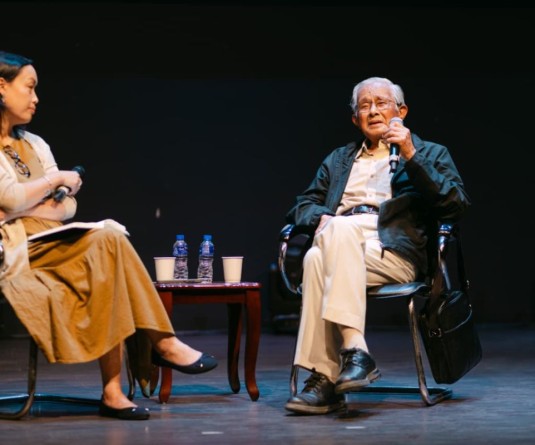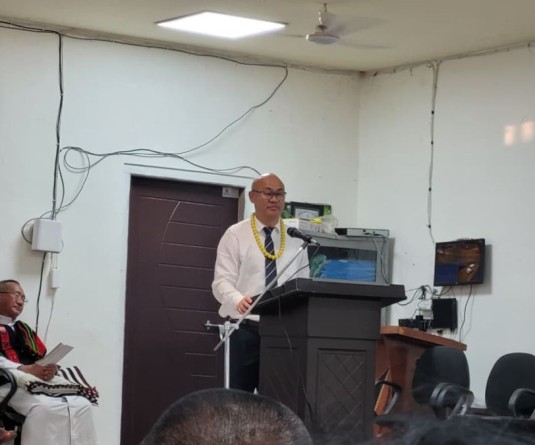
Our Correspondent
Kohima | October 14
The standards of ‘good and bad’ behavior expressed by a society collectively points to the fact that only societies considered honorable possess the virtues of organization, discipline, mutual attention and compassion. These characteristic have established a society of justice, freedom and equality valued by civilization and that disorganization, indiscipline, crime, disunity, injustice and social privilege points to symptoms of a sick society, speakers of a seminar on Gandhian principles and thought in Kohima, said today.
Academicians and social workers from Nagaland and outside today discussed on Mahatma Gandhi’s concept of religion ‘on a humanistic perspective’ at the Imagine Nagaland hall, Administrative Training Institute in Kohima. Altogether, 11 colleges and higher secondary schools from Kohima took part in the event.
Resource person Dr. Arenla, Ph.D in Gandhian Studies said that in assessing the standard of good and bad in the collective behavior of society as a whole, the only societies considered honorable possess the virtues of organization, discipline, mutual attention and compassion. These characteristic have established a social order based on justice, freedom and equality, she said. Disorganization, indiscipline, anarchy, disunity, injustice and social privilege have always been considered manifestations of decay and disintegration in a society, the scholar said.
She explained that robbery, murder, adultery or corruptions have always been condemned. Slander and blackmail have never been considered healthy social activities, while service and care of the aged, helping relatives, respecting neighbors, loyalty to friends, aiding the weak, the destitute and the orphans, and nursing the sick are qualities that continue to be highly-valued since the dawn of civilization.
’Individuals who are honest, sincere and dependable, whose deeds match their words, who are content with their own rightful possessions, who are prompt in the discharge of their obligations to others, who live in peace and let others live in peace, and from whom nothing but good can be expected, have always formed the basis of any healthy human society,’ she said.
“These examples show that human moral standards are universal and have been well-known to mankind throughout the ages. Good and evil are not myths, but realities well understood by all. A sense of good and evil is inherent in the very nature of man. Mahatma Gandhi too held the same view. He holds that the nature of man is good. The nature of man is peaceful, and it is the innate nature of man. Man is made in the image of God. Gandhi, who developed a universalistic outlook towards religion gained popularity not only in India but also in the world,” Dr. Arenla said.
She said Gandhi taught the people that every religion is fundamentally equal and true and that inter-religious dialogue would be conducive to lasting inter-religious harmony and growth of all religions. “He believed that if only we could all of us read the scriptures of different faiths from the standpoint of the followers of those faiths we should find that they were at bottom all one and were all helpful to one another. He argued that each religion has its own contribution to make to human evolution. He regarded the great faiths of the world as so many branches of a tree, each distinct from the other though having the same source.”
She said Gandhi believed in religion in the broader sense of the term and not in the conventional sense. By religion Gandhi did not mean blindly following the beliefs of particular faith, neither did it mean simply believing nor preaching the particular beliefs systems without practicing it, she said.
For Gandhi, Dr. Arenla said, morality and religion goes hand and hand. Religion minus morality cannot exist and again morality cannot be observed without religion.
Also, resource person Dr. Venusa Tinyi, joint secretary of the Overseas Naga Association said Gandhi’s worldview was to a great extent influenced by various cultural forces of his time; some of his most influential ideas however developed as a reaction against those forces. His time saw rapid advancement in the field of science and technology which in some way almost earned a messianic status for its claims and promises to free humankind from their pathetic living conditions, from innumerable miseries and sufferings that plague humankind.
It even succeeded in converting some people to scientism, a kind of dogma which holds that science has answer for everything, Dr. Tinyi said. He said Gandhi was a rare exception and a beautiful contrast; like many great minds of his time, he was also fascinated by religious studies. He was as much exposed to western thoughts as did to Indian thoughts and also to popular science and traditional religions of the world.
Dr. Tinyi said: “It is interesting to note that Gandhi was visibly religious and did not allow himself to be challenged by the doubts and questions raised by positivist science or western secular ideas. Rather he made use of western ideas to combat the evil forces prevalent amongst the Indian societies and likewise employed Indian ideas to withstand the attack of western hegemony and other imperialistic designs. Not only that he did well to find and weave together good ideas that are common to both the East and the West and thereby made it possible for people of both the hemispheres to understand the language he spoke. In this way, Gandhi displayed all the positive traits of a universal outlook despite his commitment to Indian nationalism.”
Dr. Pangernungba, lecturer in Clark Theological College of Mokokchung said peace is the only way and hope for a shared humanity in the 21st century; Gandhi’s ‘understanding’ of truth, non-violence, love and human interdependence serve as indispensable resources in one’s struggle for peace in the world. Dr. Pangernungba said the purpose of education is to form non-violent holistic persons and help develop capacities of self-independence and cooperation.
‘A Gandhi an analysis of our educational system would mean that our education system is a huge producer of violence. If we don’t teach our children peace, someone else will teach them violence’ said Dr. Pangernungba. Being a true student today means striving to be a peace student, he added.
Another speaker, James Swu, EAC in Tuensang, said religion was the centre of Gandhi’s life, thought and work. He regarded politics as applied religion. For him, religion and morality are inseparable. Politics bereft of religion is ‘absolute dirt’, even to be shunned. Thus his entire view of religion is an integrated one, Swu said.
Renowned social worker Niketu Iralu cited the example of Abraham Lincoln and Nelson Mandela, among others, and called upon the students to follow the principles held by these great men. Violence has no religion but peace has religion and hope for humanity, Iralu said. Understanding the truth and holding on to the truth are the only means to finding any solution for any problem, he said.
(With inputs from DIPR)






